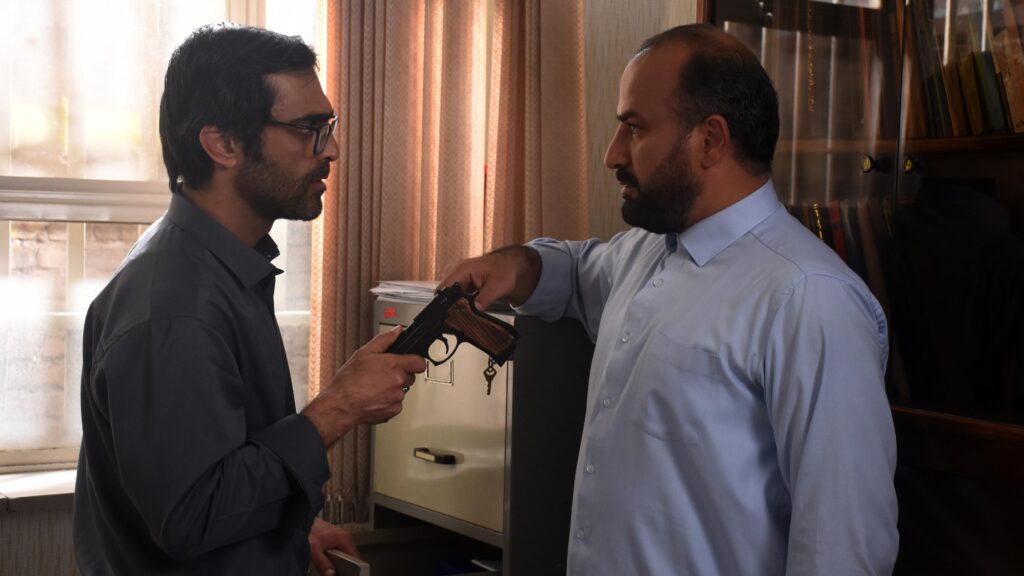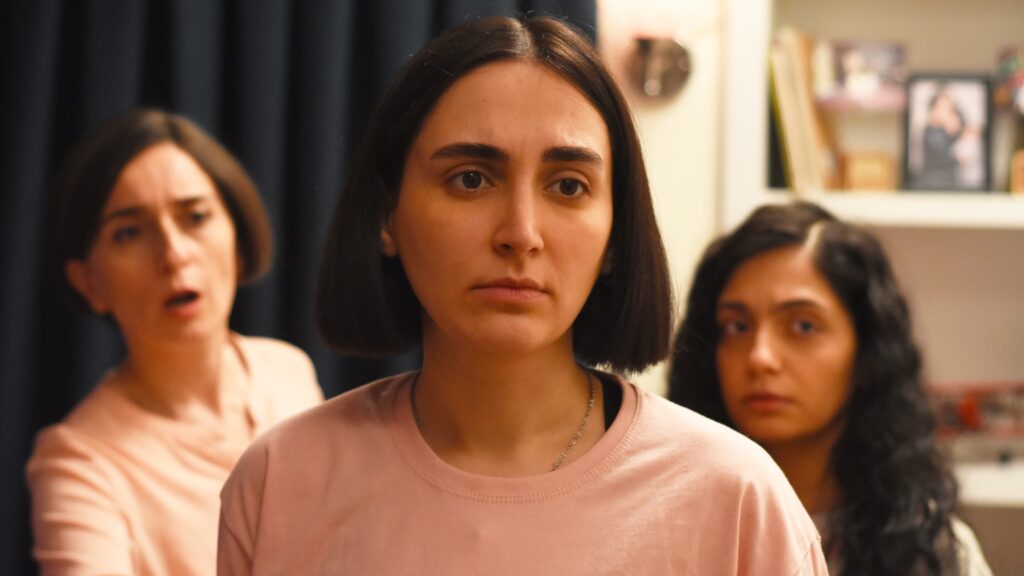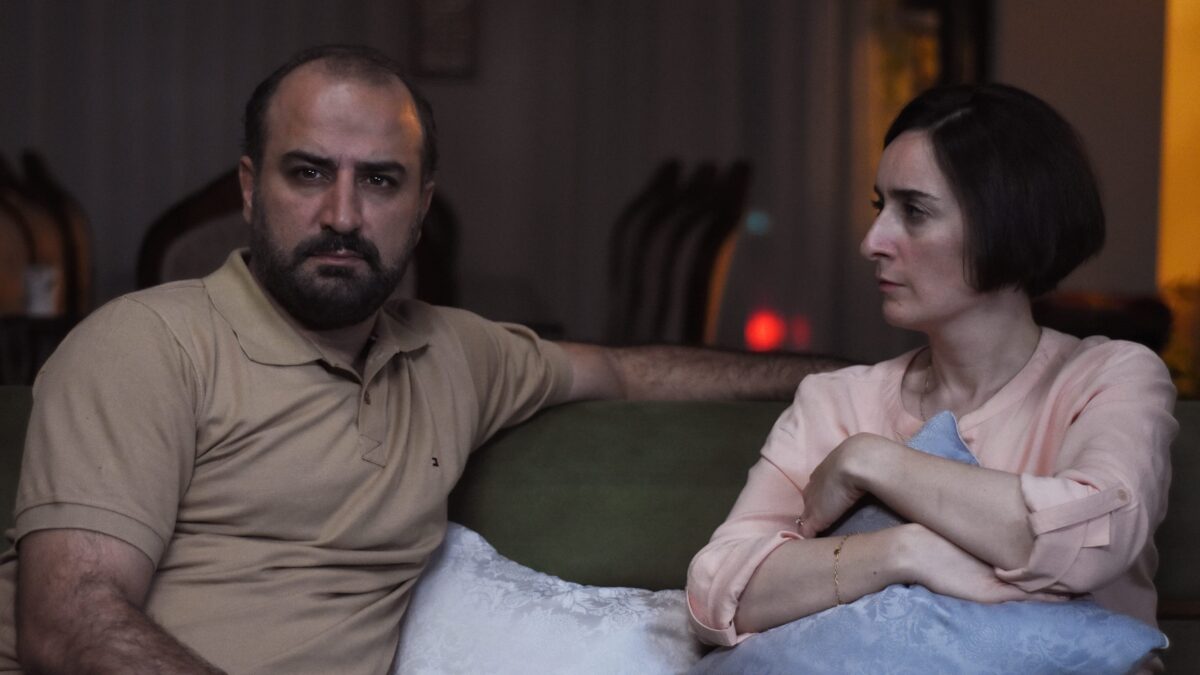Giving them Tehran around
Watching The Seed of the Sacred Fig is a bit like the conversation that Homer Simpson has with the dealer of the cursed Krusty the Clown doll. The setting and scenario and voice of the film — an Iranian filmmaker capturing the essence of an incendiary political moment of his home country — is so interesting that it basically ensures that you’re going to feel generous towards it unless you apply a bad faith reading. (That’s good.) But that’s basically another way of saying that audiences are going to speak in hyperbole and grade the film on a curve. (That’s bad.) But, honestly, it’s earned, because the film’s real-life context colors the entire story to enriching effect, the authentic tensions enlivening every minute of the material. (That’s good.) But it also means the story is often more interested in political messaging than effective dramaturgy. (That’s bad.) But as a result, when the story takes a pivot from a talky drama to a tense thriller, it’s especially harrowing and charged. (That’s good.) But the climax of that thriller section includes three characters on the run, with one of them muttering the all-time cliche “we should split up.” (…) That’s bad. (Can I go now?)
The Seed of the Sacred Fig is the latest by Mohammad Rasoulof, whose career of films with fierce political messages has been marked by repeated attempts at suppression by the Iranian government. The film follows the family of judge Iman (Missagh Zareh) after he is promoted to the Revolutionary Court, the body that prosecutes crimes against Islamic reign in Iran, during a time of social unrest in Tehran. Seed of the Sacred Fig introduces Iman as honest and dignified, undertaking his role with a solemn vow to use discretion and morality in prosecution. The opening scene shows Iman being assigned a handgun for personal safety as part of his promotion. If only dramatic theorists had a rule to tell us whether we can expect that gun to play a pivotal role in the film’s later acts.
Almost immediately, the powers above instruct Iman to rubber stamp every case that gets handed to him, putting him in a tough spot. He worked his whole career to get to this position, and the wages and prestige from his new role provide his family more comfort and, at face value, safety. He rationalizes aloud that these cases are being speed-run through the justice system because of the urgency of the unrest, and that everyone will get a fair shake by trial. But he knows, as does his wife Najmeh (Soheila Golestani) who reassures him, as does the audience, that this is not true: The people he is indicting are political protesters, and the higher court is using the cases as means to apply institutional violence against the protests.

This sets up a moral dilemma: Iman believes the protesters should be treated fairly with due process. But his bosses and colleagues tell him in no uncertain terms that he’ll be canned, perhaps even prosecuted and publicly shamed, if he pushes back at all. How far will Iman go in following orders that are askew from his professional ethics? How is this complicated by the fact that his personal values (conservative Muslim faith and support of the regime) do not align with the people he is leading to the metaphorical (and, honestly, borderline-literal) slaughter by kowtowing to the authority? It sets up an unstable equilibrium that could fall one of two ways: he either breaks bad and sacrifices his morals as he becomes a part of the institution, or else he becomes sympathetic to the protesters and starts his own version of the protest from within the system.
My biggest disappointment with The Seed of the Sacred Fig is that it has no interest in exploring this conflict head-on. After the opening scene, almost the entire movie takes place outside of the office, and we get little insight into what Iman’s job entails and what’s going on in his brain. He comes home each night irritable and tired, which makes him inherently less patient with his children who dabble in liberal rhetoric but reap the benefits of his job. But this pushback is driven more from emotional and spiritual exhaustion rather than any obvious moral slippage, like a driver on a road trip who promises to turn the car around if his annoying kids don’t stay quiet. If not for the gun he stashes in his nightstand after work every day, his position may as well be janitor working extra hours. He imposes his will, and he never threatens to stop. The result is that the film presupposes that Iman will break bad and become a face of government corruption without really exploring the path to get there.
The first half of the film’s arduous 165 minute runtime is a domestic drama. We spend a lot of time with Najmeh and daughters Rezvan (Mahsa Rostami) and Sana (Setareh Maleki). Najmeh, as the bridge between regime-lackey dad Iman and their more liberal daughters, ends up with the film’s richest portrait. Her motherly instincts (including some implied latent feminism that’s never really teased out) make her sympathetic to Rezvan, Sana, and their protesting friends. Her love for her husband and acceptance of his position push her in the exact opposite direction. One moment, she’ll be affectionate towards her daughters; the next, cold and strict and demanding, and it’s a credit to the screenplay and Golestani’s performance that this ambivalence is well-realized and intriguing.

Very little actually happens during this long opening act of the film. It’s all about table setting: the characters, the political context, the theme of repression — especially of women. It’s almost exactly the halfway point of the film when the real inciting incident occurs: Iman’s gun disappears. This sends Iman into a paranoid spiral; he increasingly lashes out and turns against his family when it’s not clear to anyone, including the audience, what happened to the gun. This gives a much more dramatic and cinematic shape to the film’s second half than the first.
It’s not all perfectly executed, but it is at key points quite tense, particularly the closing half hour. Perhaps this is a deliberate silver lining of the very slow opening; we’ve seen enough of the uncomfortable “normal” lives of this family that their immersion into physical danger is quite gutting. The climax is symbolic without putting too fine a point on it; if you read the daughters Rezvan and Sana as representing Iran’s promising youth, Iman representing a government that claims to care for its people but does so through violent subjugation, and guns representing the shifting power between different parties, then the genre work of the film’s ending makes for a rich political parable.
Rasoulof’s script is over-ambitious in both length and reach. It’s essentially two 80-minute films wed together, tackling the political protests from all sorts of different thematic and narrative angles. It’s simply too much for a single film. Rasoulof’s story doesn’t thread the needle in some of its most important beats and ideas, like an interrogation scene that should be more of a tipping point than it is, or the aforementioned opacity on Iman’s moral evolution.
But from a directorial perspective, I found Rasoulof’s work on the film to be excellent; the production is tactile and well-shot. He coaxes powerful performances out of all of four of the leads. (Rohstami, who plays the elder daughter, has this wonderfully expressive face that seems designed by God for cinema.) The film offers more than enough gripping scenes and haunting moments, especially in the second half, to make the long and bumpy road there worth it. That’s good!
Is It Good?
Good (5/8)
Dan is the founder and head critic of The Goods. Follow Dan on Letterboxd. Join the Discord for updates and discussion.


2 replies on “The Seed of the Sacred Fig (2024)”
This is a good review, but I found the last 30 minutes, far from “a rich political parable,” a hugely disappointing copout. Obviously it’s impossible to say what I’m talking about without spoilers, but ask yourself whether the conclusion goes out of its way in the allegory to downplay the culpability of “the people” and to imply that social change is virtually accidental. I loved the first two hours, but thought Rasoulof lost his never in the ending — and that is really surprising given the sacrifices he made to make the film — he, and the cast, are incredibly brave, but seemingly won’t confront the implications of the actions of the resistance.
Rasoulof is obviously working from an angle critical of the government overall. The opening two thirds of the film are a bit more ambivalent than the ending, because we see the complicated relationship between the domestic peace that the government job brings to Iman’s family, but through the daughters and their friends also come to sympathize with the protestors. But even then, we’re primed to be suspicious of the government, and I never got the sense that Rasoulof wanted us to view the protestors as anything other than justified and in the right. The ending felt like a logical conclusion to this for me — the government personified (Iman) turning into a vicious and paranoid aggressor.
I am curious what your take is on the ending and how it failed to depict the agency or culpability of “the people” as represented by Rezvan, Sana, and Najmeh. I’m not at all an expert on global geopolitics, which includes Iran’s political context, so I’m sure there’s nuance and important context slipping past me. I mostly come at these films from a storytelling perspective rather than a political perspective, but obviously that context is very important to a film like this.
(If you do reply, feel free to include spoilers, you can just add a spoilers warning before it.)